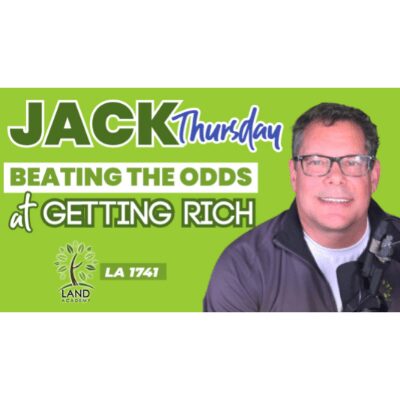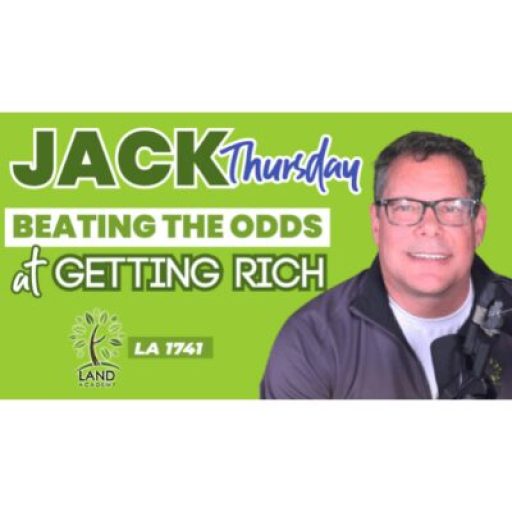Jack Thursday – Beating the Odds at Getting Rich (LA 1741)
Jack Thursday – Beating the Odds at Getting Rich (LA 1741)
Transcript:
Steven Jack Butala:
Steven and Jill here.
Jill K DeWit:
Hello.
Steven Jack Butala:
Welcome to the Land Academy Show, entertaining land and investment talk. I’m Steven Jack Butala.
Jill K DeWit:
And I’m Jill DeWit, broadcasting from The Valley of the Sun.
Steven Jack Butala:
Today’s Jack Thursday. I’m going to talk about beating the odds at getting rich. I found a very, very interesting summary of millionaires and billionaires and percentages and what really is going on out there in the world about getting wealthy in this country.
Jill K DeWit:
I love it.
Steven Jack Butala:
Before we get into it, let’s take a question posted by one of our members on the landinvestors.com online community. It’s free. Please don’t forget to subscribe on the Land Academy YouTube channel and comment on the shows you like.
Jill K DeWit:
Drew wrote, “Hello all, and Steven Jack Butala, sorry in advance if I’m missing something, I’m rewatching Land Academy 3.0 and it seems like I’m having trouble determining what Jack says are the percentages of each. I’m not finding what the range is. So what’s the range in categories and what’s the percentage range for the red, yellow and green for days on market, new list of soul and parcels on the market? This is our red, yellow, green test. Does the Excel file that you made for this lesson auto-populate or do we have to mainly make the adjustments ourselves to determine what is accurate for red, yellow and green?
Steven Jack Butala:
Land Academy 3 this is a very good question, which is why I put it on Jack Thursday instead of Jill Friday.
Jill K DeWit:
What the heck? None of my stuff’s intelligent. Thanks very much.
Steven Jack Butala:
Jill comes at this from a different way, which is [crosstalk 00:01:40]
Jill K DeWit:
My questions tomorrow’s going to be what color should I pick my website background? Thanks a lot.
Steven Jack Butala:
Jill and I just come toward this edit from a different angle. What do we teach in the Land Academy 3.0 program is you need to find a place to send mail. It works everywhere, but why not make it easy on yourself and go through this process I call trolling to see where there’s properties that fit your acquisition criteria and all that. And when you find some places that make sense, or you think it makes sense to send mail, test it. And that’s what Drew’s asking about, this red, green, yellow test that you’re asking about, or that you’re telling us to use, where on a red, green, yellow test I look at maybe five adjacent zip codes. Maybe let’s say, just for example, in West Dallas, which is a hot market, and I pit them against each other and see who’s got the best days on market.
Steven Jack Butala:
There’s several statistics in there, how much property’s been listed, how much property’s been sold in the last month. So you’re not shooting blind, you’re doing this. So what Drew is asking is how do I know what is all green and I should send mail there? What’s all yellow or what’s red where I shouldn’t send mail and which percentages work? And my answer is, and everybody answered in Discord the same way I’m about to answer, it’s all relative. You can’t take a look at Alaska, let’s say, and a couple of zip codes outside of Anchorage and apply the same percentages for red, green, yellow that you can in West Dallas, it’s apples to oranges. You can apply those types of apples to apples comparisons if they’re all in the same market. And so he’s asking me what are the percentages? What makes it green? If it’s 30 days or less days on market, then I send a mail? No, it’s not like that. It’s all relative.
Steven Jack Butala:
What happens in Alaska is relative to Alaska and maybe specifically Anchorage. And what happens in Dallas is those five zip codes are going to tell you where to send mail in Dallas. Oh my God, Jack, can you make this more complicated? This is not a easy button. This is not throw a bunch of stuff at the wall and see what sticks. This is why there’s not seven million people in Land Academy. This is why right now enrollment’s closed. Joel closed it because she feels like we have enough people and she doesn’t want to let any more people in. Our staff is helping everybody. Most people are making a ton of money. And this is one of those reasons. This is the real reason I chose this question, aside from the fact that it’s a good question, it takes studying and research and dedication and hard work and it’s really, really worth it at the end. It’s a great question.
Jill K DeWit:
Cool.
Steven Jack Butala:
Today’s Jack Thursday. I’m going to talk about beating the odds at getting rich. This is why you’re listening. A company put out recently some statistics about being a millionaire and a couple up about being a billionaire, which I thought I’d share with you.
Jill K DeWit:
This is actually really cool.
Steven Jack Butala:
The percentage of people who are millionaires in the country, one in 32. It’s 3%. It’s a lot higher than I thought. Older than 62, one in seven. So that’s 12% of the people who are older than 62, 12% of them are millionaires, largely because of the house they live in. The vast majority are because of the house they live in.
Jill K DeWit:
Makes sense.
Steven Jack Butala:
Younger than 40, one in 55. That’s 1.78%. No surprise there. They haven’t had time for their house to appreciate. These are my opinions. The statistics are not my opinions, they’re real. Education, one in 23.
Jill K DeWit:
That have high school?
Steven Jack Butala:
High school education, sorry.
Jill K DeWit:
One in 23 have high school.
Steven Jack Butala:
4.2%. College degree, one in six, 13%, 13 and a half. Postgraduate degree, one in 3%. That’s almost 34% of the people who have a postgraduate degree, meaning a graduate or a PhD, are millionaires.
Jill K DeWit:
We need to print this out and tape it on our son’s door.
Steven Jack Butala:
That’s staggering. How many millionaires are there, and why?
Jill K DeWit:
Oh, this is a good one.
Steven Jack Butala:
Eight in 10, which is 80% of all the millionaires, have inherited the money.
Jill K DeWit:
We’re going to tape this on our kids’ door too.
Steven Jack Butala:
That means two out of 10 worked for it like us, like all of us.
Jill K DeWit:
Exactly.
Steven Jack Butala:
Four in 10 of all millionaires, which is 41%, are currently working. That’s all of us too.
Jill K DeWit:
We’re not stopping.
Steven Jack Butala:
See the theme here?
Jill K DeWit:
Mm-hmm (affirmative). Oh. This is a good one.
Steven Jack Butala:
Nine out of 10 say that are wealthy due to hard work. 95% of the people say that.
Jill K DeWit:
I agree.
Steven Jack Butala:
But just above that, eight out of 10 inherited the money. Somebody’s lying. It’s not us.
Jill K DeWit:
Well, it’s a different stat, I think.
Steven Jack Butala:
The odds of running a successful startup on your own.
Jill K DeWit:
Wow.
Steven Jack Butala:
Not Land Academy, because you have a whole support group and all that, but the odds of starting…
Jill K DeWit:
In the world of startups.
Steven Jack Butala:
Running a startup, one in 200. It’s half of 1% succeed at a startup.
Jill K DeWit:
This is amazing. This is great. I love this.
Steven Jack Butala:
I’m not trying to sell you anything here.
Jill K DeWit:
No, this is awesome. I like this.
Steven Jack Butala:
The numbers should be selling themself. Let’s go the other way and see what happens if you don’t do anything. The chance of reaching the poverty level over a 10 year period, these are for all people, four and 10. So you have a 44% chance of reaching that poverty level if you don’t go to school and don’t do anything like what we do. The percentage of people who believe most people can make it if they’re willing to work hard, six and 10, 60%, only 60% of the people believe that hard work is the answer to becoming a millionaire. Percentage of people who believe that they will become a millionaire in their lifetime, three in 10, 30%. That’s just sad.
Jill K DeWit:
I know.
Steven Jack Butala:
Percentage of people who are billionaires in our country.
Jill K DeWit:
With a B.
Steven Jack Butala:
It’s one in 578,000 people.
Jill K DeWit:
That’s pretty small.
Steven Jack Butala:
Jill and I used to teach a class, which is a very material part of why we started Land Academy. We were substitute teachers, co-instructors for a master’s degree class called entrepreneurship. And it was the last class of getting an MBA that these kids would take, and we would frequently do it because the instructor’s a real, super good friend of ours.
Jill K DeWit:
And he liked to travel.
Steven Jack Butala:
He just asked us and we’d teach a class. And honestly, that’s one of the reasons we started Land because I loved it. And I asked everybody every time we taught the class, “What do you think an entrepreneur is? This is the last class in your MBA. You’re you’re going to graduate three weeks from now with a master’s degree. Who do you want to be? Or what do you think being an entrepreneur is? And what does that look like to you?” And every single person with very, very few exceptions said Mark Zuckerberg. We just said 278, that’s just not the case. That’s like winning the lottery. One in 278,000 are going to become a billionaire. That’s not what you want. How about we just make a million bucks a month really quietly like we do and like a lot of Land Academy members do?
Jill K DeWit:
I’ll take even a million a year. We talked about that. What do you really need to live on? You know what I mean? This is realistic for me too. There’s a point where you cross that line, you’re like, “It’s not going to change your lifestyle at all.” This is some of the good stuff that we talk about within career path, it’s funny because a lot of people in career path are already there. They just don’t know how to stop. And it’s a good problem to have because we have that too.
Steven Jack Butala:
Here’s my point, and everything I read support it, you have to get educated. Whatever that means to you, number one, you have to get educated to become wealthy, whatever that means. Number two, becoming a billionaire is stupid. That thought is just silly. Making a couple million dollars a month or whatever wealth means to you is very, very accomplishable and realistic. It takes a lot of work and a lot of dedication. What they didn’t talk about in here, which I really think they should have, is who’s sitting next to you while you’re doing this, because that’s a massive issue. I don’t how you quantify that.
Jill K DeWit:
Thank you. I appreciate that.
Steven Jack Butala:
We have a lot of people lately joining Land Academy that are couples and, it seems like it’s working for them, and career paths specifically and women.
Jill K DeWit:
And women on their own. I love it. We’re beating these odds.
Steven Jack Butala:
Yes. And many, many, many people in our group get a book length email once a week thanking me for doing this. I’m sure you do too.
Jill K DeWit:
I don’t think you should let this discourage you, this is not meant to discourage you. This is meant to light a little fire under you. And that’s what I think this is, because I don’t think like that. I hope that you’re like me and as you’re hearing this you’re going, “That’s ridiculous.”
Steven Jack Butala:
Well, what I heard out of all these statistics are if you get educated there’s a total totally very, very realistic chance that you’re going to become a millionaire.
Jill K DeWit:
Well, truth time, I don’t have a bachelor’s degree. I don’t even have an associate’s degree. Could, I have enough credits under my belt, trust me, but I’m not that odd. I’m not those people. I read everything I get my hands on. I’m really educated in a lot of other ways. Boy, I take a lot of stuff, I just don’t have the formal paperwork to go with it so maybe that’s part of it.
Steven Jack Butala:
I think you’ve been educated for all over your life specifically about buying and selling land for a bunch of reasons. And then once you had that basic education, you took it to some place I didn’t even know it could go.
Jill K DeWit:
Thank you.
Steven Jack Butala:
Again, it’s not negative. It’s amazing to me how much the odds increase after you get educated and then execute, apply some super hard work.
Jill K DeWit:
True. I agree with all of that. Happy you joined us today. Five days a week you can find us here on he Land Academy Show.
Steven Jack Butala:
Tomorrow’s Jill Friday. She’s going to talk about why Airtable is imperative when buying and selling land. You are not alone in your real estate ambition.
Jill K DeWit:
It’s not going to be a screenshot scenario because that’s way too boring. Seriously, we’re not going to do that to you. So don’t even think about that. Don’t worry. Hey, thanks for tuning in. We hope you find our content valuable and we really do appreciate your support. If you haven’t already, please check out our YouTube channel, hit the subscribe button and don’t forget, because we showed you this week, also yesterday, if you are a Land Academy member and you’re not on Discord, you need to be there. Check it out. You need help getting in, just send a note to support@landacademy.com.
Steven Jack Butala:
We are Jack and Jill. Information…
Jill K DeWit:
… And inspiration…
Steven Jack Butala:
To buy undervalued property.
If you enjoyed the podcast, please review it in Apple Podcasts . Reviews are incredibly important for rankings on Apple Podcasts. My staff and I read each and every one.
If you have any questions or comments, please feel free to email me directly at steven@BuWit.com.
The BuWit Family of Companies include:
I would like to think it’s entertaining and informative and in the end profitable.
And finally, don’t forget to subscribe to the show on Apple Podcasts.















